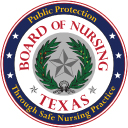
Texas Board of Nursing Approves Emergency Amendments to Rule 217.24 relating to Telemedicine Medical Prescriptions-6/8/20
The Texas Board of Nursing held an emergency meeting on June 8, 2020 at 3pm by teleconference to consider emergency amendments to Rule 217.24 relating to Telemedicine Medical Prescriptions. The Texas Board of Nursing posted this notice pursuant to the Texas Government Code
§§551.041, 551.045, and 551.125.
Background:
On March 13, 2020, the Governor of the State of Texas certified COVID-19 as posing an imminent threat of disaster to the public health and safety and declared a state of disaster in all counties of Texas. On March 16, 2020, due to the declared COVID-19 emergency, the Governor of the State of Texas suspended certain provisions of the Texas Open Meetings Act that require government officials and members of the public to be physically present at a specified meeting location and authorized virtual and telephonic open meetings in an effort to reduce non-essential in-person contact.
The global pandemic of COVID-19 constitutes an emergency or urgent public necessity within the meaning of the Texas Government Code §551.045. Further, travel limitations are necessary to mitigate the risk of exposure to COVID-19 and render convening a quorum of the Texas Board of Nursing at one location difficult or impossible. Additionally, there is an urgent public necessity for the Texas Board of Nursing to carry out the functions and duties of the Board. On March 23, 2020, the Office of the Governor granted a waiver of the Texas Board of Nursing Rule 217.24(e)(1) that limits the Advanced Practice Registered Nurses’ ability to issue prescriptions for controlled substances for chronic pain via telemedicine. The initial waiver, and subsequent extension of the waiver from this prohibition for refilling controlled substances for chronic pain patients evaluated via telemedicine was in effect until June 6, 2020. Due to the expiration of this waiver, an emergency meeting is necessary to consider an emergency rule to allow Advanced Practice Registered Nurses the ability to issue prescriptions for chronic pain via telemedicine during the duration of the COVID-19 emergency declaration.
Accordingly, the Texas Board of Nursing held a public meeting by telephone conference, as allowed under the Texas Government Code §551.125(b).
The Board voted to approve the following highlighted amendments to Tex. Admin. Code §217.24. Telemedicine Medical Service Prescriptions :
(a) – (d) (No change.)
(e) Limitation on Treatment of Chronic Pain. Chronic pain is a legitimate medical condition that needs to be treated, but must be balanced with concerns over patient safety and the public health crisis involving overdose deaths. The Legislature has already put into place laws regarding the treatment of pain and requirements for registration and inspection of pain management clinics. Therefore, the Board has determined clear legislative intent exists for the limitation of chronic pain treatment through a telemedicine medical service.
(1) Treatment of chronic pain with scheduled drugs through use of telemedicine medical services is prohibited, unless otherwise allowed under federal and state law. For purposes of this section, "chronic pain" means a state in which pain persists beyond the usual course of an acute disease or healing of an injury. Chronic pain may be associated with a chronic pathological process that causes continuous or intermittent pain over months or years.
(A) Notwithstanding paragraph (e)(1), treatment of chronic pain with scheduled drugs through use of telemedicine medical services is not prohibited by this rule if the patient is an established chronic pain patient of the APRN and is seeking telephone refill of an existing prescription, and the APRN determines that such telemedicine treatment is needed due to the COVID-19 pandemic.
(B) If a patient is treated for chronic pain with scheduled drugs through the use of telemedicine medical services as permitted by (e)(1)(A), the medical records must document the exception and the reason that a telemedicine visit was conducted instead of an in-person visit.
(C) An APRN, when determining whether to utilize telemedicine medical services for the treatment of chronic pain with controlled substances as permitted by (e)(1)(A) above, shall give due consideration to factors that include, at a minimum, date of the patient’s last in-person visit, patient co-morbidities, and occupational related COVID risks. These are not the sole, exclusive, or exhaustive factors an APRN should consider under this rule.
(D) The emergency amendment of this rule effective June 8, 2020 shall be in effect for only 30 days or the duration of the time period that the Governor’s disaster declaration of March 13, 2020 in response to the COVID-19 pandemic is in effect, whichever is shorter.
(2) Treatment of acute pain with scheduled drugs through use of telemedicine medical services is allowed, unless otherwise prohibited under federal and state law. For purposes of this section, "acute pain" means the normal, predicted, physiological response to a stimulus, such as trauma, disease, and operative procedures. Acute pain is time limited.



